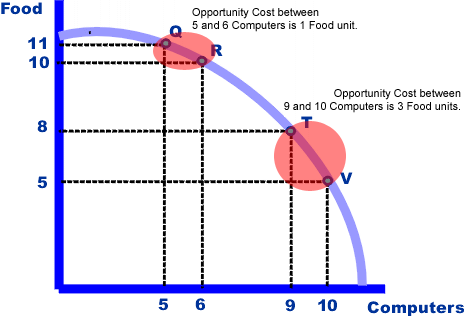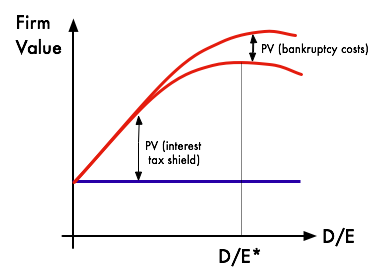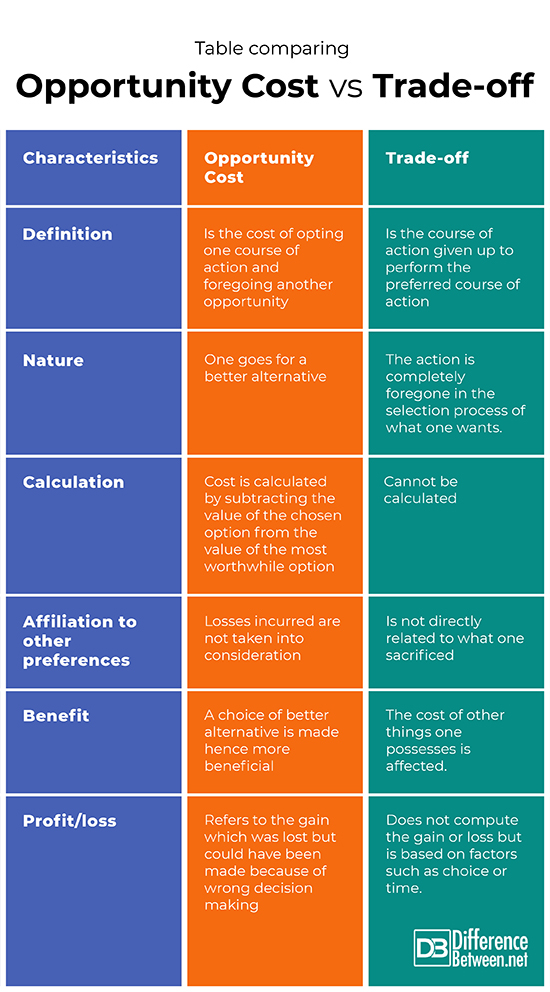Difference Between Opportunity Cost and Trade-Off
In any economic action, choices have to be made in order to best possible utilize the scarce resources. Whenever a choice is made, one or more options have to be foregone. Economics use various terms to explain this, such as opportunity cost and trade-off.
What is an Opportunity Cost?
Opportunity cost is the cost of the opportunity that is missed and hence makes a comparison of the rejected option and the accepted option.
For example, a student who wants to enroll at a far way university lands a work opportunity at a company that is near his current location. The student, however, chooses to attend the university and forego the job. By choosing the university education, he or she will give up the opportunity to the well-paying job. The job is hence the opportunity cost of attending university.
It is important to note that the opportunity cost is determined by a person’s money, needs, wants and hence a course of action can be different for different entities or individuals, therefore, what is valued more for one individual varies among other individuals.
Opportunity cost can be computed by use of competitive advantage, cost of capital, consumer choice, time management, production possibilities, and career choice.
The most popular formula of computing opportunity cost is the return of the most beneficial option less the return of the preferred choice.
What is a Trade-off ?
Trade-offs are the options we give up, so as to obtain a particular product, experience or service that we want. It is a deal that arises as a compromise, whereby to obtain a certain aspect one has to lose another aspect. This comes with accepting the loss of something when making a selection.
As there are no specific means of calculating a trade-off, determining the trade-off in a situation is not always easy. It is easier for a person who is in a dilemma to rank the preference alternatives from top to bottom, as it helps in making the decision on what to trade off.
For example, a person who is torn between staying in for the night, seeing a friend or seeing the parents is facing a trade-off. If the person decides to see the parents, staying in for the night and seeing the friend becomes the trade-off. Trade-offs however changes depending on a person’s preference.
Similarities Between Opportunity Cost and Trade Off
- In both concepts, one has to select an option among the many choices
- In both, each choice made means another alternative has been forgone
Differences Between Opportunity Cost and Trade Off
-
Definition of Opportunity Cost and Trade off
While opportunity cost is the cost of opting one course of action and foregoing another opportunity, a trade-off is the course of action given up to perform the preferred course of action.
-
Nature of Opportunity Cost and Trade off
In an opportunity cost, one goes for a better alternative while in a trade-off; the belonging is sacrificed completely in the selection process of what one wants.
-
Calculation
While the value of the opportunity cost is calculated by computing the return of the most beneficial option less the return of the preferred choice, a trade-off does not have a formula for calculation.
-
Affiliation to other preferences
In an opportunity cost, losses incurred are not taken into consideration. A trade-off, on the other hand, is not directly related to what one sacrificed.
-
Benefit of Opportunity Cost Vs. Trade off
In an opportunity cost, a choice of better alternative is made hence more beneficial. On the other hand, despite the fact that in a trade-off one gets what was actually demanded, the cost of other things one possesses is affected.
-
Profit/Loss
An opportunity cost refers to the gain which was lost but could have been made because of wrong decision making. A trade-off, however, does not compute the gain or loss but is based on factors such as choice or time.
Comparison Table: Opportunity Cost vs. Trade-off
Summary of Opportunity Cost vs. Trade-Off
Opportunity cost and trade off are two concepts that are used in many life situations. The two concepts came about due to the concept of scarcity, as people have to decide among many alternatives in alternatives to spending their time and money. Opportunity cost is hence the act of choosing a project over the other, while a trade-off refers to other actions which a person would be doing, apart from what one is doing. It is important to understand the difference and learn when to apply them in real life.
- Difference Between Profit Center and Investment Center - July 2, 2022
- Difference Between Anti-Trust and Anti-Competition - June 6, 2022
- Difference Between Stocktaking and Stock Control - June 6, 2022
Search DifferenceBetween.net :
Leave a Response
References :
[0]Blinder Alan & Baumol William. Microeconomics: Principles and Policy, 2007 Update. Cengage Learning Publishers, 2007. https://books.google.co.ke/books?id=tpF8L6EytYcC&pg=PA92&dq=Difference+Between+Opportunity+Cost+and+Trade+Off&hl=en&sa=X&ved=0ahUKEwjboOjt5fTeAhWRzYUKHWpcBpIQ6AEIKDAA#v=onepage&q=Difference%20Between%20Opportunity%20Cost%20and%20Trade%20Off&f=false
[1]Mankiw Gregory. Brief Principles of Macroeconomics. Cengage Learning Publishers, 2016. https://books.google.co.ke/books?id=SuS5DQAAQBAJ&printsec=frontcover&dq=Difference+Between+Opportunity+Cost+and+Trade+Off&hl=en&sa=X&ved=0ahUKEwjboOjt5fTeAhWRzYUKHWpcBpIQ6AEITjAG#v=onepage&q=Difference%20Between%20Opportunity%20Cost%20and%20Trade%20Off&f=false
[2]Smith R., Adams W., & Nigel W. Trade-offs in Conservation: Deciding What to Save- Volume 8 of Conservation Science and Practice. John Wiley & Sons Publishers, 2011. https://books.google.co.ke/books?id=ju30VGWm1pwC&pg=PA21&dq=Difference+Between+Opportunity+Cost+and+Trade+Off&hl=en&sa=X&ved=0ahUKEwjU_Yq65_TeAhUIy4UKHfcCDvY4ChDoAQg0MAI#v=onepage&q=Difference%20Between%20Opportunity%20Cost%20and%20Trade%20Off&f=false
[3]Image credit: https://commons.wikimedia.org/wiki/File:TradeOff.png
[4]Image credit: https://commons.wikimedia.org/wiki/File:Ppf2_small.png



